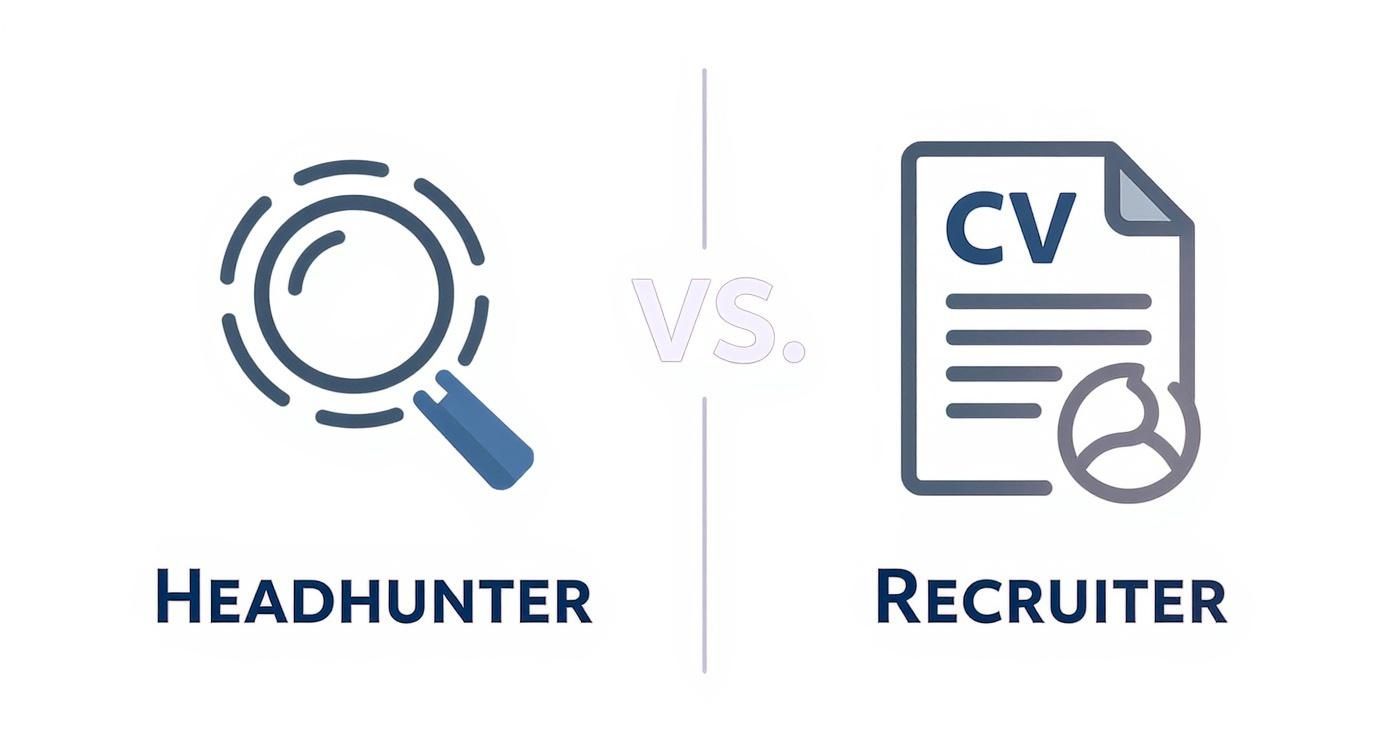Ever had a company hire a detective to find the perfect person for a top-secret job? Someone who isn't even looking for a move? That's pretty much what a headhunter does. They are specialist recruiters brought in to track down high-calibre candidates for senior, executive, or incredibly niche roles.
Unpacking the Role of a Headhunter

A headhunter, often called an executive search consultant, plays in a different league to your average recruiter. Their allegiance is to the company that has hired them on a retained basis, not the person looking for a job. The goal is simple: fill a crucial position that is often confidential and will almost never be seen on a public job board.
Think of them less as recruiters and more as strategic partners in a company's future. They don't just post an advert and hope for the best. Instead, a headhunter painstakingly maps out the industry, identifies the top performers who are smashing it in their current roles, and then makes a quiet, compelling approach.
This proactive search is a cornerstone of any serious what is talent acquisition strategy, as it's all about long-term planning for a company's talent pipeline.
The Value in a Competitive Market
This targeted method is absolutely vital in the UK's cut-throat hiring market. Headhunters are a massive part of the UK's recruitment industry, which is valued at around £43 billion. They give employers a direct line to talent that would otherwise be impossible to find, making sure businesses secure the leaders and specialists they need to get ahead.
Their real value shines through in a few key areas:
- Access to Passive Talent: They excel at getting the attention of professionals who aren't actively job hunting but are exactly the kind of people you want on your team. They know how to pique the interest of someone who is perfectly happy where they are.
- Confidentiality: Need to replace a current executive without causing a panic? A headhunter can run the entire search under the radar, protecting sensitive company information.
- Market Expertise: The best headhunters live and breathe their specific industry. They have unparalleled networks and can offer incredible market intelligence back to their clients, from salary benchmarks to competitor insights.
Headhunter vs Recruiter: The Key Differences
It’s a common mistake to use ‘headhunter’ and ‘recruiter’ interchangeably, but in reality, their worlds are quite distinct. To confuse the two is like mixing up a specialist heart surgeon with a GP – both are doctors, sure, but their methods, focus, and the situations they’re called into are fundamentally different.
A traditional recruiter typically works on what’s called a contingency basis. This means they only get paid if their candidate gets the job. They’re often juggling multiple roles at once, working through a pipeline of active job seekers who’ve applied via job boards or are already in their system. Their game is about volume and speed, usually filling junior to mid-level positions.
On the other hand, a headhunter—more formally known as an executive search consultant—is hired on a retained basis. A company pays a substantial fee upfront to secure their services for an exclusive, deep-dive search. They’re not playing a numbers game; their mission is about surgical precision.
Headhunters meticulously map the market to pinpoint the absolute best person for a critical, high-stakes role. More often than not, this person is a ‘passive’ candidate: a high-performer who is happy and successful in their current job and not even thinking about moving. If you're curious about how businesses engage different hiring specialists, our guide on how to work with recruitment agencies offers more insight.
Headhunter vs Recruiter at a Glance
To really get to grips with the difference, it helps to see it laid out side-by-side. The core distinctions come down to how they're paid, who they're talking to, and the nature of their relationship with the client.
A headhunter is a strategic partner, brought in for their deep industry knowledge and network. A recruiter is more of a service provider, filling a pressing need quickly.
Ultimately, both play vital roles in the hiring world, but they operate in completely different arenas. One is about proactively hunting for top-tier, hidden talent for leadership roles, while the other is about efficiently matching active candidates to available vacancies.
Inside the Headhunting Process
So, how does a headhunter actually track down that one perfect person for a highly specialised role? It's less about luck and more about a meticulous, multi-stage operation that combines detective-level research with some seriously persuasive communication skills. The whole process is built on confidentiality and strategic insight, making it a high-stakes mission to find top-tier talent.
It all kicks off with an in-depth client briefing. A headhunter will spend a great deal of time with the hiring company, getting under the skin of not just the role’s technical demands, but also the company culture, the team dynamics, and the long-term goals driving the hire. This allows them to build a rich, multi-dimensional picture of the ideal candidate – something that goes far beyond a standard job description.
Once they have that profile, the real "hunt" begins. This isn't about posting an ad on a job board and waiting. It’s about proactively mapping the market to find the right people.
Mapping the Talent Landscape
First, headhunters identify which companies are likely to have the best people for the job. They might even build out organisational charts to pinpoint key individuals within those target companies. Using their extensive networks, industry contacts, and specialised databases, they create a longlist of potential candidates. Critically, most of these people aren't actively looking for a new job.
This infographic gives a great visual comparison of how a headhunter's focused search differs from a traditional recruiter's broader approach.

As you can see, it's about precision (the magnifying glass) versus volume (the stack of CVs). This is the fundamental difference in their methods.
When a headhunter has a target in their sights, the initial approach is always discreet and carefully managed. That first conversation is a delicate dance – they need to spark interest and present a compelling, potentially career-defining opportunity, often without revealing the client's identity straight away.
A huge part of the process is then getting candidates ready for the next steps. The headhunter acts as a coach, making sure they are well-briefed and understand how to prepare for an interview effectively.
After rigorous vetting, multiple interviews, and thorough reference checks, the headhunter presents a highly curated shortlist to the client – usually just the top two or three candidates. From there, they stay involved to manage the final stages, guiding delicate salary negotiations and finalising the offer to ensure everything goes smoothly for everyone involved.
Why Top Companies Rely on Headhunters
With in-house HR teams and countless job boards, why would a company pay a hefty fee for a headhunter? It’s a fair question, but the answer goes well beyond just filling a vacancy. Top companies bring in headhunters to tackle high-stakes hiring challenges that standard recruitment methods simply aren't built for.
The biggest reason is gaining access to the passive talent pool. These are the top-tier professionals who are already excelling in their roles. They aren't scrolling through job adverts because, frankly, they don't need to. A headhunter has the network and the finesse to approach these individuals discreetly, presenting an opportunity that's genuinely compelling enough to make them listen.
Then there’s the crucial element of confidentiality. Picture this: a company needs to replace a key executive, or perhaps it's building a new team for a top-secret project. Advertising that role publicly would send shockwaves through the company and tip off competitors. Headhunters act as a silent partner, keeping the entire search under wraps until the final stages.
A Strategic Return on Investment
Beyond just access and discretion, a good headhunter’s deep industry knowledge delivers a fantastic return on investment. They bring real-time market intelligence to the table—everything from competitor movements to salary benchmarks—which helps companies make smarter, more informed decisions. This expertise not only saves a huge amount of internal time and effort but also dramatically cuts the risk of making a very expensive bad hire.
A headhunter’s value isn't just in finding candidates; it's in finding the right candidate. Their objective assessment and rigorous vetting process ensure that only the most qualified and culturally aligned individuals make it to the shortlist, securing leadership that will drive future growth.
This specialised focus is more important than ever. The UK's recruitment industry, with revenues now around £24 billion, is booming precisely because it helps solve complex talent shortages. As skills gaps continue to widen, headhunters are essential for finding professionals with proven abilities, not just a list of qualifications. You can find more data on the UK's employment placement industry growth on ibisworld.com.
How to Get on a Headhunter's Radar

While headhunters are hired by companies, not candidates, that doesn't mean you have to sit back and wait. The smartest professionals know how to position themselves so they’re the ones who get the call.
Forget about firing off unsolicited CVs into the void. The real strategy is to become so visible and respected in your field that headhunters can't help but find you. This is about shifting your mindset from a reactive job seeker to a proactive career architect.
The aim is to build a strong professional brand that screams expertise. When a headhunter starts their search for a top-tier role, you want your name to be on that first list. That process almost always starts online, where a staggering 95% of recruiters use LinkedIn to find talent. This means the first, most critical step is consistently optimizing your LinkedIn profile.
Cultivate Your Professional Visibility
Think of yourself as a product and your career as a brand. To attract the right opportunities, your brand needs to be polished, professional, and easy to find. This isn't about bragging; it’s about clearly demonstrating your value to the market.
A few key actions can make a massive difference:
- Build a Keyword-Rich Profile: Make sure your LinkedIn headline and summary are packed with the right industry keywords and, more importantly, quantifiable achievements. This is precisely how a headhunter's search tools will find you.
- Engage with Your Network: Don't just be a collector of connections; be a contributor. Share insightful articles, offer thoughtful comments on industry news, and join relevant group discussions to showcase your expertise.
- Become a Voice: Think about writing articles on LinkedIn, speaking at industry events, or joining a webinar panel. When you establish yourself as a thought leader, you become highly discoverable.
The most effective strategy is simply to make yourself findable. Headhunters are expert researchers. Your job is to create a trail of professional excellence that leads directly to you, making their search for top talent that much easier.
In the end, your reputation is your biggest asset. By building a strong network and consistently proving your expertise, you ensure that when a career-defining opportunity comes along, you’re the person a headhunter thinks of first.
For more direct strategies, check out our guide on https://www.beyondhire.co/blog/how-to-find-a-headhunter for more actionable steps.
Right, let's clear up a few things about headhunters. The world of executive search is often a bit mysterious, and a lot of myths have sprung up around what these professionals actually do. Getting a clear picture is key for both companies and potential candidates.
Myth 1: Headhunters Find Jobs for People
This is probably the biggest misconception out there. Let's be crystal clear: a headhunter's client is the company, not the job seeker.
Their entire mission is to find the perfect person for a specific, often critical, role on behalf of the organisation that hired them. Think of them as talent scouts for the company, not career agents for individuals. They aren't in the business of finding you a job; they're in the business of finding their client a person.
Myth 2: It's All About the C-Suite
Another popular myth is that headhunters only chase after CEOs, CFOs, and other top-level executives. While they certainly handle plenty of C-suite searches, their scope is much wider than just the boardroom.
In reality, headhunters are often brought in to find people with very specific, hard-to-find skills. They might be looking for:
- A leading cybersecurity expert who's a known authority on a particular type of digital threat.
- A software engineer with rare expertise in a niche programming language.
- A seasoned project manager with a proven track record of delivering massive, complex infrastructure projects.
The real job of a headhunter is to find scarce talent, no matter the job title. Their value comes from their knack for identifying and persuading top performers with critical skills to consider a new opportunity.
Once you get past these common fictions, you can start to see the real strategic value that headhunters bring to the table when a company needs to build a truly exceptional team.
Got Questions About Headhunters? We’ve Got Answers.
Dipping your toe into the world of executive search for the first time? It's natural to have a few questions. Let's clear up some of the most common ones people ask.
How Do Headhunters Get Paid?
This is a key difference between them and other types of recruiters. Headhunters almost always work on a retained basis. Think of it like hiring a specialist consultant; the company pays a large portion of the fee upfront to secure their dedicated time and expertise for a specific, high-level search.
The total fee is typically a percentage of the successful candidate's first-year salary, usually falling somewhere between 25% and 35%. This payment structure cements their role as a committed partner in a serious, in-depth talent hunt, rather than a contingency recruiter who only gets paid if they fill the role.
Should I Just Send My CV to a Headhunter?
In short, probably not. It’s a common misconception, but headhunters are hired by companies to fill specific, hard-to-fill roles—they aren't in the business of finding jobs for individuals who send them a CV. Your unsolicited email will likely just get lost in the shuffle.
A much better strategy is to make yourself findable. Build a standout profile on LinkedIn, become known in your industry, and focus on your professional network. That way, when they start hunting for someone with your exact skills, your name is the one that pops up.
Key Takeaway: Don't chase the headhunter; make them want to find you. The best way to get on their radar is to be exceptional at what you do and have a professional presence that reflects it.
How Can I Spot a Legitimate Headhunter?
A real pro will be discreet, professional, and incredibly knowledgeable about your industry. They won't just throw a job description at you; they'll want to properly understand your career, your ambitions, and what makes you tick. They should be able to talk intelligently about the company they represent (even if they can't name it at first) and the challenges of the role.
Red flags? Watch out for anyone who asks you for money—ever. A reputable headhunter is paid by the hiring company, never the candidate. Generic, mass-email-style messages are also a sign that you’re not dealing with a serious executive search consultant.

